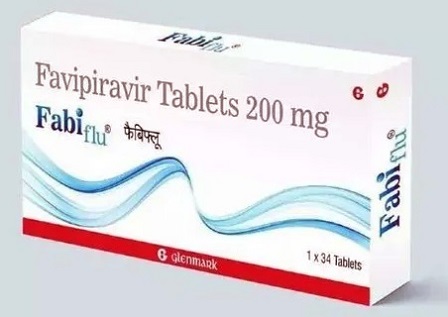Favipiravir That Was Used to Treat COVID-19 Actually Causes Lung Inflammation, Lung Damage and Lung Fibrosis!
Nikhil Prasad Fact checked by:Thailand Medical News Team Jan 03, 2025 3 months, 1 week, 3 days, 8 hours, 34 minutes ago
Medical News: A Pandemic Solution Under Scrutiny Favipiravir, an antiviral drug initially lauded as a beacon of hope during the COVID-19 pandemic, is now under intense scientific scrutiny. The drug, widely used to reduce viral replication in COVID-19 patients, has come under fire following revelations about its potential adverse effects on lung health. Two recent studies, one conducted by researchers from Erciyes University, Faculty of Medicine, Turkey; Kayseri City Training and Research Hospital, Turkey; and Adıyaman University, Faculty of Medicine, Turkey, and another by Atatürk University Faculty of Veterinary Medicine, Turkey, highlight alarming evidence of lung inflammation, damage, and fibrosis caused by favipiravir. This
Medical News report delves into these groundbreaking studies, their methodologies, findings, and implications.

Favipiravir That Was Used to Treat COVID-19 Actually Causes Lung Inflammation,
Lung Damage and Lung Fibrosis
Favipiravir’s Origins and Mechanism of Action
Favipiravir, developed by Japan’s Toyama Chemical Co. Ltd., was designed as a broad-spectrum RNA-dependent RNA polymerase inhibitor. It targets viral replication and has been used against influenza, SARS-CoV-2, and other RNA viruses. The drug’s initial widespread adoption was based on its ability to curb the viral load, offering hope amidst the global health crisis. However, concerns about its safety profile emerged as adverse effects were reported, ranging from hepatotoxicity to gastrointestinal disturbances. Now, the drug’s impact on lung tissue adds another layer of complexity to its evaluation.
Study 1: Investigating Lung Toxicity
Researchers from Erciyes University, Kayseri City Training and Research Hospital, and Adıyaman University conducted a study to evaluate favipiravir’s impact on healthy lung tissue. This investigation utilized four groups of rats: one control group receiving saline and three experimental groups receiving low, medium, and high doses of favipiravir for ten days. Histopathological and immunohistochemical analyses revealed dose-dependent lung damage, including:
-BALT Enlargement and Fibrosis: Favipiravir-treated groups showed significant enlargement of bronchus-associated lymphoid tissue (BALT), fibrosis, and inflammation.
-Elevated Inflammatory Markers: High doses led to increased levels of TNF-α, TGF-β, IL-6, and other markers indicative of inflammation and tissue remodeling.
-Collagen Deposition: Immunohistochemical staining highlighted elevated collagen-1 levels, signifying fibrotic changes in lung tissue.
These findings underscore the potential risks associated with prolonged or high-dose favipiravir use, particularly in patients with pre-existing lung conditions.
Study 2:
Oxidative Stress and Cellular Apoptosis
The second study, conducted by Atatürk University, explored the toxicological effects
of favipiravir on lung tissue over varying durations. Rats were administered 200 mg/kg/day of favipiravir for 5 and 10 days, with some subjects observed for an additional five days without treatment to assess tissue regeneration. Key findings include:
-Oxidative Stress Parameters: Favipiravir increased malondialdehyde (MDA) levels while reducing antioxidant markers like glutathione (GSH), superoxide dismutase (SOD), and catalase (CAT). This imbalance highlighted oxidative stress as a key mechanism of lung injury.
-Pro-Inflammatory Cytokines: Markers such as IL-6, NF-κB, and inducible nitric oxide synthase (iNOS) were significantly elevated, pointing to sustained inflammatory responses.
-Apoptotic Changes: Immunohistochemical analysis revealed increased expression of pro-apoptotic markers (Bax and caspase-3) and decreased levels of anti-apoptotic Bcl-2, indicating cell death pathways activated by favipiravir.
Mechanisms Behind the Damage
Favipiravir’s metabolization generates reactive oxygen species (ROS), which disrupt the oxidant-antioxidant balance, leading to oxidative stress. This stress triggers inflammatory cascades mediated by transcription factors like NF-κB, amplifying cytokine production and promoting fibrosis. Furthermore, excessive ROS and inflammatory signals induce apoptosis, compounding lung tissue damage.
Clinical Implications and Future Directions
The studies’ findings raise critical questions about favipiravir’s safety, especially in vulnerable populations such as those with chronic pulmonary diseases or prolonged exposure to the drug. While favipiravir remains a valuable tool in combating viral infections, its potential for inducing lung damage necessitates caution. Clinicians must weigh its benefits against these risks, particularly in cases of mild to moderate COVID-19 where alternative treatments may be viable.
Broader Impacts on Public Health
The revelations about favipiravir’s effects have broader implications for pharmacovigilance and drug development. These studies emphasize the need for comprehensive preclinical evaluations and post-marketing surveillance to identify and mitigate adverse effects. Public health policies must incorporate these insights to ensure safer therapeutic practices.
Conclusion:
A Call for Vigilance The findings from these studies serve as a stark reminder of the complexities surrounding antiviral treatments. While favipiravir has undoubtedly played a crucial role in managing the COVID-19 crisis, its potential to cause lung inflammation, damage, and fibrosis cannot be overlooked. Researchers urge further clinical studies to validate these results in human populations and explore mitigation strategies. As we navigate the post-pandemic era, the lessons from favipiravir’s journey highlight the importance of balancing efficacy with safety in drug development.
The study findings were published in the peer-reviewed journals: Food and Chemical Toxicology and Journal of Biochemical and Molecular Toxicology.
https://www.sciencedirect.com/science/article/abs/pii/S0278691525000018
https://onlinelibrary.wiley.com/doi/10.1002/jbt.23536
Thailand
Medical News strongly advocates that all who have been given Favipiravir to get proper detailed Medical Imaging’s done to ascertain if you are already developing Lung Fibrosis or other issues and to engage lawyers and take legal action against the manufacturer of favipiravir, the politicians and health authorities in your home country who approved the drug, the drug regulatory agencies, hospitals and doctors that prescribed the drug.
For the latest COVID-19 News, keep on logging to Thailand
Medical News.
Read Also:
https://www.thailandmedical.news/news/breaking-stanford-study-confirms-favipiravir-use-in-mild-or-asymptomatic-covid-19-patients-has-no-efficacy-doctors-should-be-sued-for-prescribing-it
https://www.thailandmedical.news/news/covid-19-drugs-latest-japanese-study-shows-association-between-high-serum-favipiravir-concentrations-and-drug-induced-liver-injury
https://www.thailandmedical.news/news/covid-19-drugs-favipiravir-avigan-fails-to-achieve-statistical-significance-in-fujifilm-trial,-effectiveness-questionable
https://www.thailandmedical.news/news/favipiravir-studies-involving-animal-models-shows-favipiravir-has-very-weak-effect-on-sars-cov-2-and-not-viable-as-an-effective-therapeutic
